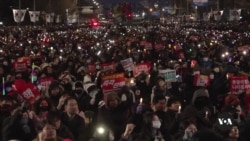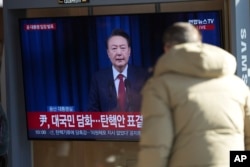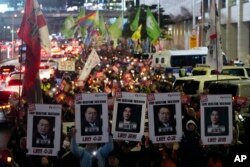South Korean lawmakers failed Saturday to impeach President Yoon Suk Yeol over his attempt to impose martial law, an outcome that delivers at least a temporary reprieve for the embattled conservative president.
During a tense session at South Korea's National Assembly, nearly all conservative lawmakers of the People Power Party, or PPP, walked out of the legislative chamber just minutes before the vote was to be held, effectively boycotting the opposition-led impeachment motion against Yoon.
For about four hours, opposition forces made an emotional, last-minute plea to persuade their conservative colleagues to return and support the impeachment measure. They ultimately failed to get even enough PPP members in the chamber for a vote to be formally held.
The liberal Democratic Party, which has a solid majority in the unicameral legislature, has vowed to quickly hold another impeachment vote, possibly as soon as next week, raising the prospect of a prolonged period of political instability. To pass, the impeachment effort needed the votes of eight conservative PPP lawmakers.
Watch related video by William Gallo:
“The public will continue to demand that the president, the instigator of this rebellion, will face prosecution or arrest,” Representative Kim Min-seok told VOA Saturday.
Kim, a senior Democratic Party leader, said the Korean public is not satisfied with Yoon's explanation for imposing martial law. “Public anger will intensify, and impeachment will just be a matter of time,” he said.
Outside the legislative compound, an estimated 100,000 people gathered to express support for the impeachment measure. The mood was a mixture of festivity and anger, as candle-waving protesters called for the arrest of Yoon and also sang popular Korean pop songs. Activist and labor groups say they will continue to hold regular demonstrations and strikes until Yoon resigns.
The protests could eventually echo those that led to the impeachment of South Korea's former conservative president, Park Geun-hye, in 2016 on corruption-related charges after weeks of demonstrations. Those developments deeply fractured the conservative party — an outcome the PPP would like to avoid this time.
After the failed impeachment effort, a PPP spokesperson said the country cannot repeat the tragedy of another paralyzed government.
Declaration of martial law
Yoon declared martial law late Tuesday, claiming it was necessary to "crush anti-state forces" and "protect constitutional order.” The decree was overturned by opposition lawmakers within hours.
Earlier on Saturday, he apologized for causing public anxiety and vowed he would not attempt a second martial law decree.
In an apparent attempt to find a path forward that does not involve his resignation, Yoon also said future governance “will be jointly handled by our party and the government.”
It is not clear how Yoon would yield any presidential authority to his ruling People Power Party, analysts said, since there does not appear to be an established political process for doing so.
Some PPP lawmakers have begun pushing for a compromise proposal, whereby South Korea’s constitution would be amended to shorten presidential terms to four years, rather than the current five.
Under such a rumored proposal, Yoon apparently would step down early and the powers of the presidency could be reduced in some manner.
However, opposition party lawmakers have given no indication they would support such a deal.
"This is a cunning tactic only in order to buy time," Kim Joon-hyung, a lawmaker with the opposition Rebuilding Korea Party, told VOA. "This regime, and the ruling party, is dead and dysfunctional, even if the impeachment vote fails.”
South Korea’s presidential office has not clarified Yoon’s remarks or whether he would support such an arrangement.
A Seoul-based law professor, who preferred not to be identified because of the sensitivity of the ongoing discussions, said there is no process by which the president can transfer the powers of the presidency to the party.
“But more importantly, I don’t think that’s what [Yoon] meant,” he said. “I think he merely meant that he will follow whatever decision the party makes regarding how to stabilize the situation. ... Whether that refers to constitutional revision is unclear.”
Yoon and his party may be trying to avoid a vacancy in the office of the president, because under such a scenario, an election must be held, according to the constitution, he said.
“President Yoon seems to be trying everything he can to hang on to power,” said Hans Schattle, a professor of political science at Yonsei University. “But the idea of him staying in office any longer seems totally out of sync with the public outrage right now.”









